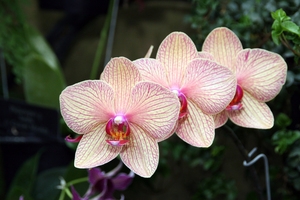Member Plants
Upcoming Global Events

24th World Orchid Conference, Germany
There are currently no photos of plants of
Anoectochilus setaceopictus
for sale by members of ORCHIDS.ORG.
Below are other recent plants for sale:
Log in to Add a Comment

Author is Ken Slump, posted about 5 years ago
A 12-Step Plan for Becoming a Successful Orchid Grower
IF YOU ARE NEW TO THE ORCHID hobby and perhaps feel you are not enjoying the success with your plants that you had hoped for, read throug...
Read More

Author is Roy Tokunaga, posted over 5 years ago
We take water for granted. It falls out of the sky. It flows from the faucet. Oahu city water is considered good for growing Orchids. We use it without thought or concern.
If you study orch...
Read More
Do you have a plant for sale or trade
which you cannot ship or do not want to bother shippping?
No problem.
Click here to make a local-only offer.
It's a free service to our members.
Orchid Species: Anoectochilus setaceopictus
Kew currently accepted name is Anoectochilus setaceus
Anoectochilus setaceopictus is an orchid species identified by K.Koch & Lauche in 1857. Culture information and photos for this orchid are commonly detailed under the currently accepted name of Anoectochilus setaceus.
Genus
Anoectochilus (Anct.)
Grex
setaceopictus
Parents
Species
Author
K.Koch & Lauche
Year
1857
ORIGIN: Found in the eastern Himalayas, Assam, Bangladesh, Nepal, Sri Lanka, western Himalayas, Bhutan, Thailand, Laos, Yunnan China, Vietnam, Java and Sumatra in shady broad leafed, evergreen, humid primary forests in soils dampened by mists and splash along steep watercourses at elevations of 300 to 1800 meters.
DESCRIPTION: Miniature to small sized, hot to cool growing terrestrial orchid in rich humus in damp crevasses with subcordate to ovate-acute, velvety, dark lime-green reticulated with gold leaves that are purple black on the underside that blooms in the fall on a glandular-pubescent, 10 [25 cm] long, 2 to 15 [rarely single] flowered inflorescence with ovate, 1 to 3 veined, glandular pubescent dorsally bracts carrying successively opening flowers .
FLOWER SIZE: Less than 3/4 inch [less than 1.85 cm] -- information provided by Jay Pfahl, author of the Internet Orchid Species Encyclopedia (IOSPE).
DESCRIPTION: Miniature to small sized, hot to cool growing terrestrial orchid in rich humus in damp crevasses with subcordate to ovate-acute, velvety, dark lime-green reticulated with gold leaves that are purple black on the underside that blooms in the fall on a glandular-pubescent, 10 [25 cm] long, 2 to 15 [rarely single] flowered inflorescence with ovate, 1 to 3 veined, glandular pubescent dorsally bracts carrying successively opening flowers .
FLOWER SIZE: Less than 3/4 inch [less than 1.85 cm] -- information provided by Jay Pfahl, author of the Internet Orchid Species Encyclopedia (IOSPE).
Other Names
| Genus Name | Genus | Grex Name | Year | Author | |
|---|---|---|---|---|---|
| Add+ | Anoectochilus | Anct | setaceus | 1825 | Lindl. |
| Add+ | Anoectochilus | Anct | aureus | 1857 | K.Koch & Lauche |
Featured Site Articles
Read Latest Articles
Beginners Start Here

Water: The Most Important Nutrient
New Topics
- Al Schotz asked question Gomesa bifolia in category General Discussion
- Kjell Meershoek started topic Re-inventing an orchidarium.. your thoughts in category Curiosity
- David George asked question Odom's Fascination - an unusual orchid in category General Discussion
- Carol Holdren asked question Grow Tent in the Garage in category General Discussion
- David George asked question rlc Caotan Beauty found at Home Depot in category Cattleya Alliance
New Comments
- Mary Lane commented on article "Aerangis citrata" by Tom Kuligowski
- Kjell Meershoek commented on topic "Re-inventing an orchidarium.. your thoughts" by Kjell Meershoek
- Inga Kruppa commented on member plant Acacallis cyanea Х Paradisanthus micranthus by Inga Kruppa
- Carol Holdren commented on topic "rlc Caotan Beauty found at Home Depot " by David George
- Carol Holdren commented on topic "Odom's Fascination - an unusual orchid" by David George
- Dr. Florian Wolf commented on topic "Wild. Lisa Devos" by Maria Fernandez
- Michael Valcarcel commented on member plant Rlc. Chief Takanaka by Walceli Muniz Valverde
- Michael Valcarcel commented on member plant Rlc. Montana Spirit by Michael Valcarcel
- Michael Valcarcel commented on member plant Ctt. Blazing Sun by Michael Valcarcel
- Michael Valcarcel commented on member plant Bc. Spotted Clown by Michael Valcarcel
- Maria Skrypnyk commented on member plant Yamadara Redland Sunset by Maria Skrypnyk
- André Pessina commented on topic "Odontocidium Orchid fungus?" by Kristin Dorris
- Linda Hartman commented on topic "Image of a plant please" by Leshya Perkins
- Paul Reavis commented on orchid Milt. Kismet
- Christiaan Viljoen commented on member plant Psh. fragrans by Christiaan Viljoen
- Christiaan Viljoen commented on member plant Z. maculatum by Christiaan Viljoen
- Christiaan Viljoen commented on member plant C. Gaskell-Pumila 'Azure Star' by Christiaan Viljoen
- Robert H. Findlay commented on member plant Rlc. Joy Sokabe var. Volcano Queen by Sally K
- James Lunsford commented on member plant Lc. Sagarik Wax 'African Beauty AMO/AOS x Blc. Cherry Suisse'Kauai' HCC/AOS var. Cattlyea 'Hybrid ' by James Lunsford
- John Varigos commented on orchid Bulb. schwarzii



